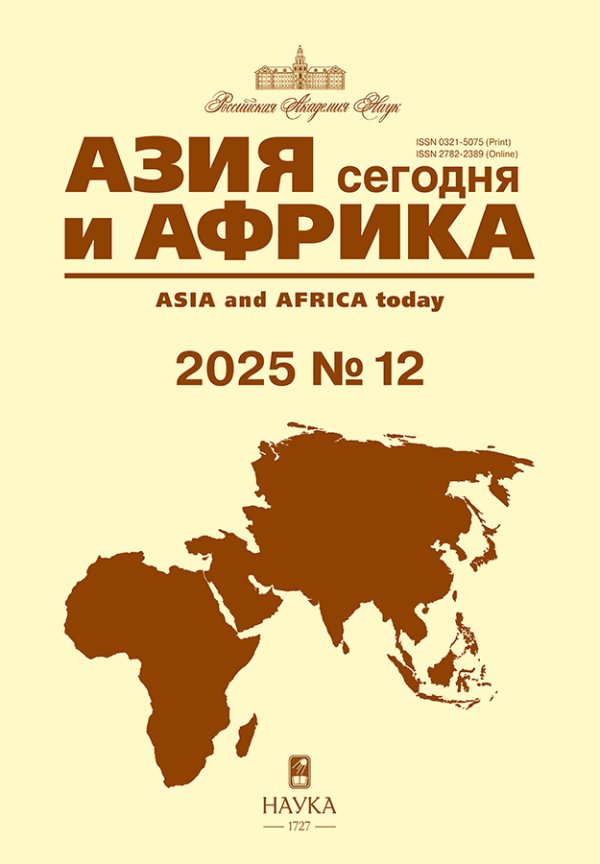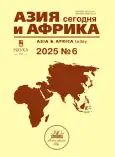Динамика развития исламского образования в Мавритании
- Авторы: Жерлицына Н.А1,2
-
Учреждения:
- Институт Африки РАН
- НИУ ВШЭ
- Выпуск: № 6 (2025)
- Страницы: 26–34
- Раздел: Политика, экономика
- URL: https://journal-vniispk.ru/0321-5075/article/view/301743
- DOI: https://doi.org/10.31857/S0321507525060035
- ID: 301743
Цитировать
Аннотация
В статье анализируется трансформация системы религиозного образования в Мавритании. Традиционное арабо-исламское образование находится в центре общественного внимания в мусульманском мире, потому что оно тесно связано как с проблемой безопасности, так и с укреплением идентичности. Современная мавританская уникальная модель религиозного образования, снискавшая авторитет и популярность в исламском мире, базируется на фундаменте исторического образовательного института под названием махдара. В статье рассматривается история возникновения махдары, цели, формы и методы обучения, адаптация древней модели образования к современности. Проведен анализ государственной политики последних десятилетий по отношению к институтам исламского образования. Установлены факторы, способствовавшие росту престижа данного вида образования. Автор приходит к выводу, что махдара смогла эффективно адаптировать свои функции, образ жизни, систему образования, социальную деятельность и интеллектуальную составляющую к современности.
Об авторах
Н. А Жерлицына
Институт Африки РАН; НИУ ВШЭ
Email: ns_inafr@mail.ru
доктор исторических наук, заместитель директора; главный научный сотрудник Центра истории и культурной антропологии, ведущий научный сотрудник, Центр изучения стабильности и рисков, Факультет социальных наук Москва, Россия; Москва, Россия
Список литературы
- Kobo O. M. Paths to progress: Madrasa education and Sub-Saharan Muslims’ pursuit of socioeconomic development. In: The State of Social Progress of Islamic Societies. H.Tiliouine & R.J.Estes (Eds.). Switzerland: Springer International Publishing, 2016. 727 p.
- Benaouda Bensaid. The Struggle of Traditional Religious Education in West Africa: The Case of Mahdara in Mauritania. Journal of Ethnic and Cultural Studies. 2019. Vol. 6. № 1. Pp. 152–161.
- Филиппов В.Р. Системный кризис «Франсафрик». Ученые записки института Африки РАН. 2024. № 2 (67), с. 144–156. doi: 10.31132/2412-5717-2024-67-2-144-156
- Filippov V.R. Systemic crisis of “FranceAfrique”. Journal of the Institute for African Studies. 2024. № 2 (67), с. 144–156. (In Russ.). doi: 10.31132/2412-5717-2024-67-2-144-156
- Tarek Ladjal, Benaouda Bensaid. Desert-Based Muslim. Religious Education: Mahdara as a Model. Religious Education. 2017. March. Pр. 529–541. doi: 10.1080/00344087.2017.1297639
- Ould Izid Bih, El Bou. Lenseignement coranique traditionnel dans les Mahadras de Nouakchott: Etats des lieux et perspectives. Réseau Ouest et Centre Africain de Recherche en Education. Mauritania. 2009. 52 р.
- Hamidou Dia. Les institutions d’éducation islamique au Sahel. Agence française de développement, Paris l, France. 2022. 47 р.
- Jirari A. The Culture of the Desert. Rabat: al-Dar al-Bayda, 1978. 73 р.
- Frede B. Following in the Steps of Аisha: Ḥassāniyya – Speaking Tijānī Women as Spiritual Guides (Muqaddamāt) and Teaching Islamic Scholars (Limrābṭāt) in Mauritania. Islamic Africa. 2014. Vol. 5. № 2. Рp. 225–273.
- Izama M.P. Muslim Education in Africa: Trends and Attitudes Towards Faith-Based Schools. The Review of Faith & International Affairs. 2014. № 12. Рр. 38–50.
- Khouma S. L’école publique laïque à l’épreuve de l’éducation religieuse: analyse d’un processus d’accommodation. Liens. 2018. Vol. 1. № 26. Рp. 113–125.
- Ould Ahmedou E.G. L’enseignement traditionnel en Mauritanie: La mahadra ou l’école «à dos de chameau». Paris/Montréal: L’Harmattan, 1997. 225 p.
- Ould Ahmedou E.G. L`enseignement coranique traditionnel dans les Mahadras de Nouakchott: Etats des lieux et perspectives. Paris: L` Harmattan, 1999. 189 р.
- Mauritanian General Population and Housing Census. National Office of Statistics. Mauritania. 1977. https://www.healthdata.org/research-analysis/health-by-location/profiles/mauritania
- Ould Abdel Wedoud M. Y. Islamic scholar links religious schools and radical ideology. Magharebia Newpaper. 2011, September 23.
- Benaouda Bensaid, Tarek Ladjal. The Struggle of Traditional Religious Education in West Africa: The Case of Mahdara in Mauritania. Journal of Ethnic and Cultural Studies. 2019. Vol. 6. № 1. Рр.152–161.
- Мелконян Л.А., Жерлицына Н.А. Действенная модель противостояния террористической опасности: успешный опыт Мавритании. Азия и Африка сегодня. 2023. № 3. С. 46–54. . doi: 10.31857/S032150750024990-1
- Melkonyan L.A., Zherlitsyna N.A. An Effective Model of Countering Terrorist Danger: Successful Experience of Mauritania. Asia and Africa today. 2023. № 3. С. 46-54. (In Russ.). doi: 10.31857/S032150750024990-1
- Mohammad M. Abul Maali. Foreign Students in Mauritanian Mahdaras: Eligible for jihad or secret migration? Kiffainfo. 2015, May 15. http://kiffainfo.net/article10183.html
- Исаев Л.М., Шишкина А.Р., Иванов Е.А. Исламское высшее образование в России: локальный опыт и влияние Ближнего Востока. Азия и Африка сегодня. 2022. № 1. С. 5–14. doi: 10.31857/S032150750018302-4
- Isaev L.M., Shishkina A.R., Ivanov E.A. Islamic Higher Education in Russia: Local Experience and Influence of the Middle East. Asia and Africa Today. 2022. № 1. С. 5–14. (In Russ.). doi: 10.31857/S032150750018302-4
- Hamidou Dia. Les institutions d’éducation islamique au Sahel. Agence française de développement, Paris l France. 2022. https://www.afd.fr/fr/actualites/agenda/les-institutions-deducation-islamique-au-sahel
- Asnib S. National Plan to Develop the Mahdara in Mauritania. Al-Arabiya news. 2015, June 30.
- Ould Abu M. Foreign students in Mauritanian courts: Candidates for jihad and secret immigration. Dune-voices news. 2017, November 29. http://dune-voices.info/public/index.php/ar
- Umar J. Mauritania aims to reform Mahdara education. Magharebia Newspaper. 2011, September 30.
- Ware R.T. The Walking Qur’an: Islamic Education, Embodied Knowledge, and History in West Africa. The University of North Carolina. 2014. 352 p.
- Maʼal-ʻAynayn wuld M Al-Amin. Ibn Al-Talamid Al-Shanqiti, his life and his legacy. MA Theses, University of Tripoli. 1984.
Дополнительные файлы











